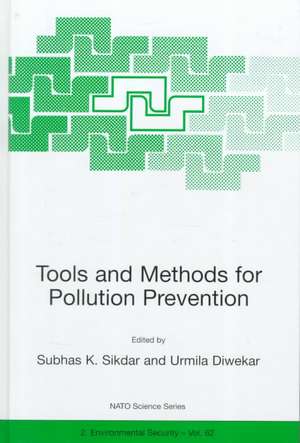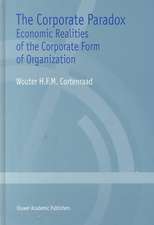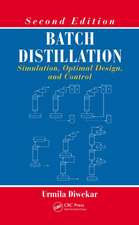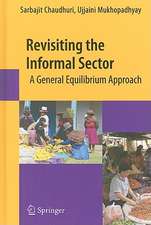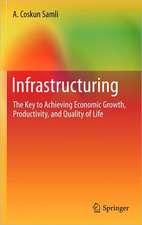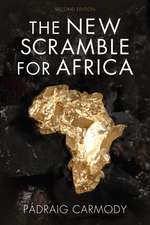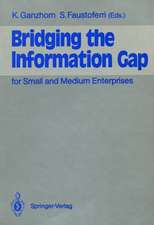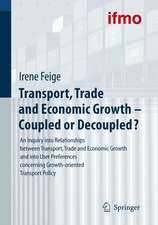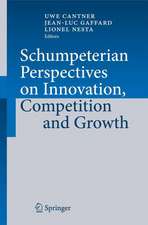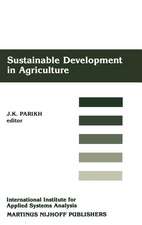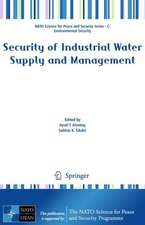Tools and Methods for Pollution Prevention: NATO Science Partnership Subseries: 2, cartea 62
Editat de Subhas K. Sikdar, Urmila Diwekaren Limba Engleză Hardback – 31 aug 1999
| Toate formatele și edițiile | Preț | Express |
|---|---|---|
| Paperback (1) | 645.47 lei 43-57 zile | |
| SPRINGER NETHERLANDS – 31 aug 1999 | 645.47 lei 43-57 zile | |
| Hardback (1) | 651.84 lei 43-57 zile | |
| SPRINGER NETHERLANDS – 31 aug 1999 | 651.84 lei 43-57 zile |
Din seria NATO Science Partnership Subseries: 2
- 15%
 Preț: 638.43 lei
Preț: 638.43 lei - 5%
 Preț: 1420.29 lei
Preț: 1420.29 lei -
 Preț: 390.84 lei
Preț: 390.84 lei - 18%
 Preț: 949.90 lei
Preț: 949.90 lei -
 Preț: 401.24 lei
Preț: 401.24 lei - 15%
 Preț: 653.14 lei
Preț: 653.14 lei - 5%
 Preț: 1414.64 lei
Preț: 1414.64 lei - 15%
 Preț: 642.18 lei
Preț: 642.18 lei - 18%
 Preț: 1846.40 lei
Preț: 1846.40 lei - 18%
 Preț: 949.90 lei
Preț: 949.90 lei -
 Preț: 380.07 lei
Preț: 380.07 lei - 15%
 Preț: 643.84 lei
Preț: 643.84 lei - 18%
 Preț: 1839.63 lei
Preț: 1839.63 lei -
 Preț: 416.64 lei
Preț: 416.64 lei - 18%
 Preț: 1234.77 lei
Preț: 1234.77 lei - 18%
 Preț: 1834.90 lei
Preț: 1834.90 lei - 18%
 Preț: 950.96 lei
Preț: 950.96 lei - 15%
 Preț: 655.78 lei
Preț: 655.78 lei -
 Preț: 403.53 lei
Preț: 403.53 lei -
 Preț: 381.98 lei
Preț: 381.98 lei - 18%
 Preț: 1836.94 lei
Preț: 1836.94 lei - 15%
 Preț: 645.47 lei
Preț: 645.47 lei - 18%
 Preț: 946.87 lei
Preț: 946.87 lei - 18%
 Preț: 1227.99 lei
Preț: 1227.99 lei - 18%
 Preț: 1232.57 lei
Preț: 1232.57 lei -
 Preț: 398.15 lei
Preț: 398.15 lei - 18%
 Preț: 1232.71 lei
Preț: 1232.71 lei - 18%
 Preț: 1223.88 lei
Preț: 1223.88 lei - 18%
 Preț: 1228.77 lei
Preț: 1228.77 lei
Preț: 651.84 lei
Preț vechi: 766.87 lei
-15% Nou
Puncte Express: 978
Preț estimativ în valută:
124.73€ • 130.56$ • 103.81£
124.73€ • 130.56$ • 103.81£
Carte tipărită la comandă
Livrare economică 31 martie-14 aprilie
Preluare comenzi: 021 569.72.76
Specificații
ISBN-13: 9780792359258
ISBN-10: 0792359259
Pagini: 383
Ilustrații: XIII, 383 p. 59 illus.
Dimensiuni: 170 x 244 x 22 mm
Greutate: 0.74 kg
Ediția:1999
Editura: SPRINGER NETHERLANDS
Colecția Springer
Seria NATO Science Partnership Subseries: 2
Locul publicării:Dordrecht, Netherlands
ISBN-10: 0792359259
Pagini: 383
Ilustrații: XIII, 383 p. 59 illus.
Dimensiuni: 170 x 244 x 22 mm
Greutate: 0.74 kg
Ediția:1999
Editura: SPRINGER NETHERLANDS
Colecția Springer
Seria NATO Science Partnership Subseries: 2
Locul publicării:Dordrecht, Netherlands
Public țintă
ResearchCuprins
Tools for Pollution Prevention.- Environmental Issues in Developed and Developing Countries: A View from the Chemical Community in the Czech Republic.- Promoting Cleaner Production as a Tool for Improvement of Industrial Production Efficiency and Environmental Protection — Experience from Newly Independent States.- Pollution Prevention: an Opportunity for the Romanian Iron and Steel Industry — Life Cycle Assessment, the First Step to Pollution Prevention.- Industry Approches to Life Cycle Assessment — German Experience and Results of a Comparative European Survey.- The Application of Life Cycle Assessment to Process Selection, Design and Operation.- Lca: Comparison Between Recycle And Reuse of Glass Beer Bottles.- Simplified Lca to Identify Ecosystem Based Detergent-Policies for the Danube Basin Countries.- Life Cycle Assessment in Pollution Prevention — Trends in Method Developments and Simplifications.- Environmental Impact in a Life-Cycle Framework: Practical Approaches for Decision Making.- The Eco-Indicator 98 Explained — Lca Impact Assessment Methodology Intended for Product Development Application.- The Role of Mass Balance Modeling in Impact Assessment and Pollution Prevention.- Environmental Impact Assessment: an Overview of Method Types and Key Factors.- Process and Equipment Design for Utility-Based Pollution Prevention.- Synthesis of Batch Processes with Integrated Solvent Recovery.- Sustainable Pollution Prevention through Mass Integration.- Process Design for Environmental Problems.- Computer Aided Product Design and Pollution Prevention through Substitution.- Designing Environmentally Benign Solvent Substitutes.- Material Substitution — History, Driving Forces and Current Developments.- Pollution Prevention Assessment Tools for Manufacturers.-Application of the Analytic Hierarchy Process for Integrating Environmental Considerations into Process Design Decisions.
